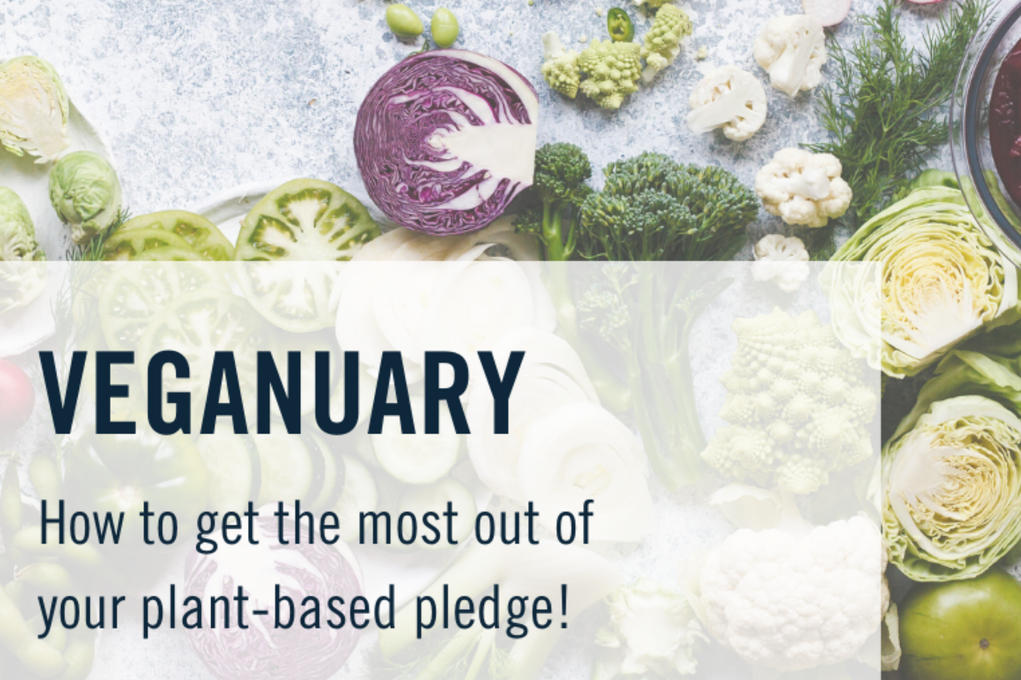Making the most of your plant-based pledge
10th January 2020 / Health
Making the most of your plant-based pledge
Emily Shannon

A record breaking 250,000 people took part in veganuary last year, with almost half saying they carried on the plant-based diet after it had ended. Even MORE are thought to be taking part this January, which is super exciting! With more and more vegan alternatives popping up, it certainly makes joining the plant party easier than ever.
However, it goes without saying, that not all vegan food is created equal with sneaky sugars and artificial additives making their way into the plant-based goodness. Here at Link Nutrition, we want to make nutrition easy and accessible for everyone, giving you the tools that you need to be able to be both happy and healthy. So, as many of you join in on the plant-based pledge, we wanted to give you some helpful pointers to make sure that you’re doing veganuary the best, healthiest way possible and not missing out on essential nutrients that fuel your body. This way you won’t miss out on any of the benefits that a plant-based diet has to offer, and feel you’ll feel fantastic!
Benefits of a plant-based diet.
Let’s start by talking about the benefits of a plant-based diet. Vegan products seem to be everywhere on the market, it’s certainly a hot-topic, but here at Link Nutrition we always want to know the science. The latest research certainly stacks up, it suggests that a plant-based diet includes a more diverse range of fruits, vegetables and wholegrains which are known to be great for our health and help to reduce the risk of developing certain diseases including coronary heart disease, hypertension, high blood pressure and type 2 diabetes.
Whilst the evidence suggests that eating a plant-based diet can be good for us, there are some nutrients that are particularly important to consider to make sure that your nutritional needs are met and to make sure that you’re feeling all of the benefits of making a pledge to veganism this January. Here are some of the most important nutrients to be mindful of:
Iron
There are plenty of plant-based sources of iron, it’s worth noting though, to increase the absorption of iron, eating foods that are rich in vitamin C at the same time can really help! Try to avoid drinking tea and coffee at mealtimes as this can affect the absorption of iron. Some of our favourite plant-based sources of iron include:
- Dark leafy veggies - we love broccoli, kale and watercress
- Nuts and seeds - we add them to our breakfast, lunch and dinner!
- Dried fruit - why not add apricots to soups and stews?
- Wholemeal flour - a rich source of iron
*NB we would recommend checking your nutrient levels prior to adopting a plant-based diet, in particular vitamin B12 and iron. It’s important to ensure that you have adequate levels of both ferritin (a protein that stores iron within the body) and transferrin (a substance that transports iron to cells) as supplementation may be required.
Calcium
An essential mineral that is abundant in dairy products like milk and cheese so it is important to make sure that you’re getting enough if you’re following a plant-based diet. Don’t worry though, there are plenty of plant-based sources of calcium, be sure to include plenty of these sources:
- Dark leafy veggies - cavolo nero and cabbages are a couple of our favourites
- Sesame seeds and tahini - sprinkle sesame seeds (over your lunch or on top of your green veggies and make yummy dressings with tahini - it’s delicious!)
- Pulses - cook these low and slow to have them at their best!
- Soya and oat milk - also contain calcium - it’s always best to stick to the unsweetened varieties!
Vitamin D
Our body requires vitamin D to help to regulate the amount of the minerals calcium and phosphate within the body. It’s essential for our immune system, the maintenance of strong bones, teeth and muscles too. During the summer months, we are able to obtain the majority of the vitamin D that our bodies require from sunlight, however during the winter months, we have to rely on the food sources and supplementation. Plant-based sources of vitamin D include:
- Tofu - We love tofu - marinate it in your favourite flavours, we like ginger and garlic!
- Mushrooms - Try making a mushroom stir-fry with plenty of green veggies, some red chilli and tofu. It’s really quick, simple and delicious!
- Fortified milks - we like soya, oat and almond.
It is worth noting here that only a small proportion of the vitamin D that we eat is able to be absorbed by our body, this means that supplementing vitamin D is often advised, particularly in the winter.
Vitamin B12
Vitamin B12 is found naturally only from animal sources. This means that for people following a plant-based diet supplementation is usually required. There are however a few fortified sources of vitamin B12, these include:
- Fortified soya milk - Make sure you opt for unsweetened!
- Fortified cereals - Again, avoid any added sugar!
Omega-3 fatty acids
Omega-3 fatty acids are essential within our diet, sometimes there’s a little confusion surrounding them. There are actually 3 types of omega-3 fatty acids: DHA docosahexaenoic acid (DHA) , eicosapentaenoic acid (EPA) and α-linolenic acid (ALA). DHA and EPA are primarily found in oily fish - which obviously isn’t any good if you’re doing veganuary; but don’t worry ALA is found in plant foods! It is, however, important to consider that the conversion of ALA in the body is lower than the other forms of omega-3 fatty acids so many people choose to supplement. Plant-based ALA sources include:
- Chia seeds - We love adding chia seeds into our overnight oats or making a chia seed pudding as an after-dinner treat!
- Flaxseeds - these can be added into breakfast cereals, smoothies or sprinkled on salads.
- Nuts and seeds - walnuts are a particularly good source, try making a walnut pesto or adding them into salads for extra crunch!
- Vegetable oils like rapeseed and linseed oil are also good plant-based sources.
Protein
We often get asked about protein sources for a plant-based diet. We’re always happy to say that plants contain plenty of protein! It is, however, still important to incorporate complete protein sources across the day, this means all of the 9 essential amino acids. Make sure that you’re eating a variety of these protein sources, this way you’ll be including all 9 essential amino acids. Great plant-based protein sources include:
- Pulses - like beans and lentils - they’re so versatile and can be added to anything from soups to salads!
- Nuts + seeds - sprinkle them on top of your breakfast or your lunchtime salad for the extra crunchy texture!
- Nut butters - We love nut butters, why not try adding them into your smoothies or making some yummy protein balls for snacking on the go! We LOVE almond butter!
- Chia seeds - Whizz up a seed mix to sprinkle over your morning breakfast cereal!
If you’re looking for some plant-based inspiration, then our go-to’s are Deliciously Ella, Hemsley and Hemsley and the Detox Kitchen. Happy Veganuary!
From The Blog
-

25th February 2025 / Health
Empowering Women’s Health: Key Supplements for Well-being
Women’s health is a lifelong journey, with each stage presenting unique nutritional and wellness needs. From maintaining energy levels to supporting hormonal balance and bone health, the right comb...
Read article -

17th February 2025 / Health
Empowering Women’s Health: Lifestyle Tips and a Key Supplement for Perimenopause and Menopause
NaomiWomen’s health evolves through various life stages, and the transition into perimenopause and menopause brings unique challenges. During these phases, hormonal fluctuations can lead to symptom...
Read article -

10th February 2025 / Health / Products
The Best Foods and Drinks to Help Your Body Recover from Burnout
Burnout is a growing issue in today’s fast-paced work culture, leaving many people feeling exhausted, overwhelmed, and depleted. While rest and self-care are essential, nutrition plays a crucial ro...
Read article



